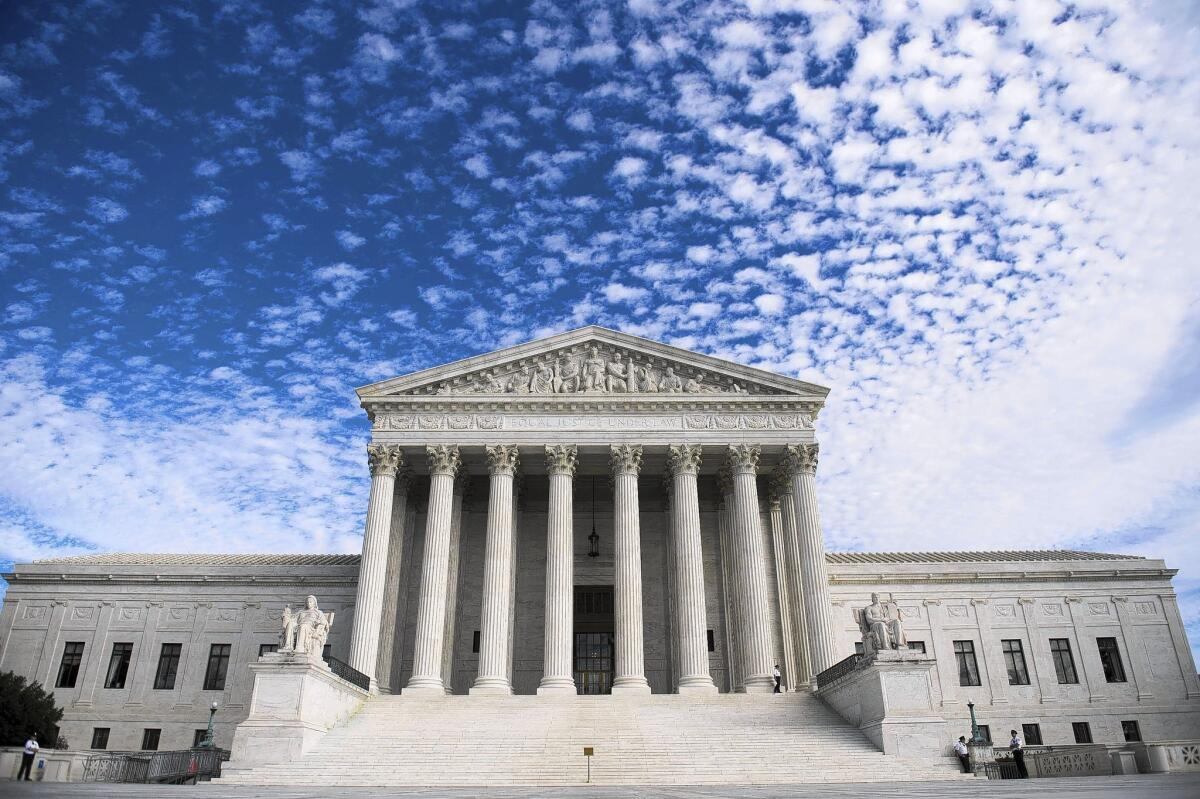Mixed Supreme Court ruling on damages for child porn victims

- Share via
WASHINGTON — Victims of child pornography whose images of sexual abuse have circulated on the Internet may demand compensation from every person caught downloading and possessing the illegal images, the Supreme Court ruled Wednesday.
But justices set aside a $3.4-million restitution order handed down against a Texas man on behalf of one victim, ruling that a single defendant who possesses the pornography may not be forced to pay the full amount of damages due the victim.
The 5-4 decision upholds part of the Violence Against Women Act and opens a new chapter in compensating victims who say the online circulation of their images has forced them to relive the sexual abuse they experienced as children. With the Internet, old photos of child abuse can circulate for years.
One such victim, identified in court papers as “Amy,” stepped forward in 2008 to seek compensation after she learned at the age of 17 that photos of her child abuse had spread across the Internet. She was 8 years old when she was sexually abused by her uncle. He was convicted, sent to prison and ordered to pay $6,000 in restitution.
As an adult, she and her lawyer went to court, citing a provision of the 1994 law that said judges shall order defendants who sexually exploit children to pay the victim “the full amount” of their losses.
Amy’s case was the first to reach the high court, and Wednesday’s ruling set out a middle-ground position.
The justices agreed that she should receive full restitution for her injuries and pain, but they said she was not entitled to seek the entire amount from Doyle Paroline of Texas, who pleaded guilty in 2009 to possessing more than 150 images of child pornography, including two that depicted a young Amy.
“It makes sense to spread the payment among a larger number of offenders in amounts more closely in proportion to their respective causal roles and their own circumstances,” Justice Anthony M. Kennedy said. “This would serve the twin goals of helping the victim achieve eventual restitution for all of her child pornography losses and impressing upon offenders the fact that child pornography crimes, even simple possession, affect real victims.”
His opinion in Paroline vs. United States leaves it to federal judges to decide on the proper amount in each case.
The court said federal prosecutors had the duty to seek restitution orders when defendants were convicted or plead guilty to child pornography charges. Lawyers credited the National Center for Missing and Exploited Children with tracking child pornography and helping victims seek compensation.
But a lawyer for the victim expressed disappointment after Wednesday’s ruling.
“As a practical matter, it may be impossible for Amy to collect the full amount if the court is ruling out big awards,” said University of Utah law professor Paul Cassell, who represented Amy. “This will mean hand-to-hand combat in lots of criminal courts.”
So far, Cassell said, Amy has recovered about $1.3 million from 180 defendants, but most of that came from a single defendant.
Cassell released a statement from Amy, who said she was “surprised and confused by the court’s decision today.… I see that the court said I should get full restitution ‘someday.’ I just wonder when that day will be and how long I … and other victims will have to wait for justice.”
Amy’s original restitution order found that she suffered $3.4 million in damages. The first federal judge to review her case against Paroline refused to give any award, deciding that her injuries were not “directly produced” by the man.
The U.S. 5th Circuit Court of Appeals, taking an opposite approach, ordered the defendant to pay the full amount.
The Supreme Court sent the case back to Texas and told the judge to set a “reasonable and circumscribed award” for Amy.
Chief Justice John G. Roberts Jr. and Justices Antonin Scalia and Clarence Thomas dissented, saying that Congress had failed to make clear whether defendants such as Paroline were liable for damages, and if so, how judges should determine the amount.
Justice Sonia Sotomayor dissented separately, saying that the defendant should be assessed the full amount of the required restitution.
More to Read
Sign up for Essential California
The most important California stories and recommendations in your inbox every morning.
You may occasionally receive promotional content from the Los Angeles Times.











